Release of the RareJob Global Leader Development Analysis Report 2020
RareJob, Inc. (hereafter “RareJob”), which utilizes data related human resources and develop global talents, conducted a survey of 289 HR person regarding human resource development, job-oriented human resources, and the human resources who can play an active role globally. We compiled trends in the employment and development of human resources in Japanese companies and publish a forecast report for 2021 and beyond.
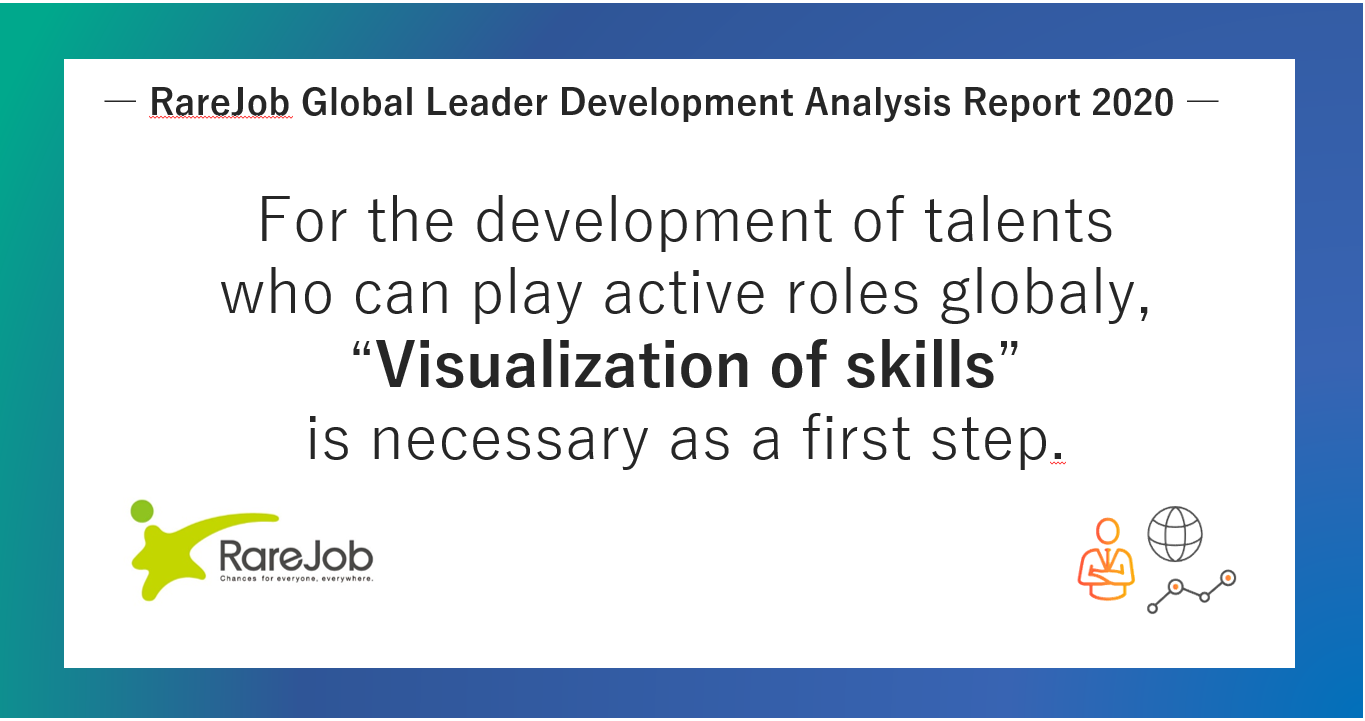
Background of Survey
In 2020, due to the impact of the COVID-19 crisis, the physical movement of global people slowed down dramatically. On the other hand, business development based on online communication and human resource training have been spreading, and there has also been a realistic development of new work styles such as remote work. Particularly in Japan, attention has been focused on a shift from “membership-type employment,” which has built a framework for the bulk recruitment of new graduates and seniority-based employment, to “job-type employment,” in which human resources are allocated to tasks. Job-type employment is also effective from the perspective of securing human resources capable of playing an active role globally, but it also requires major changes from traditional common sense in business and social structures, such as the creation of a globally competitive workplace environment, human resource development, and visualization of individual skills. Accordingly, we conducted a survey of corporate initiatives and actual conditions aimed at developing human resources capable of playing an active role globally, and explored measures that Japanese companies should aim for in corporate management and in securing and developing human resources from 2021 onward.
Summary of Survey
Survey target: HR persons using the RareJob service in a corporate contract and are considering it. (as of October 2020)
Number of responses: 289 (274 companies) *Some companies have multiple responses.
Survey period: October 13, 2020 to October 30, 2020
Survey method: Internet survey
※ If you refer some data from this survey, please write “Research of RareJob”.
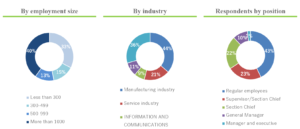
Main Survey Results
①About 90% of companies have introduced remote work. More than half of companies consider and plan to introduce job-type employment
Prior to the COVID-19 crisis, as a means of eliminating the shortage of human resources and preventing the loss of outstanding human resources, there have been making progress in the utilization of freelance and short-time employees, as well as in allowing side-jobs. In addition, many companies introduced remote work due to the COVID-19 crisis, and this trend seems to have led to the recruitment of job-type personnel and consideration of the introduction of systems. In this survey as well, 54% of companies responded that they are “investigating the pros and cons of introducing/specifically considering introducing a job-type human resource recruitment system/ introducing a job-type human resource system.”
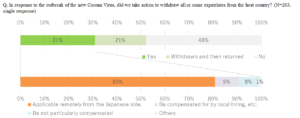
Job-type hiring is a method of “defining specific tasks and allocating personnel who can complete those tasks.” Therefore, it is necessary to quantitatively judge what skills each person possesses at what level. In the past, however, membership-type employment has been the mainstream in Japan, in which people “have individual areas of responsibility and support each other.” This highlighted the issue that “visualization of skills,” which is indispensable for promoting job-type employment, has not been sufficiently advanced.
②More than 70% of enterprises have not achieved the “visualization of skills” required for job-type employment
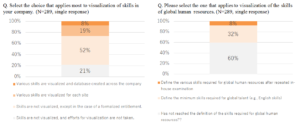
In this survey, only 28% of companies responded that “visualization of skills” is already in progress. Furthermore, if limited to “visualization of the skills of global talent” it falls to 8%. The skills required of global talent are diverse, including not only English ability, but also cross-cultural understanding and management skills. In order for Japanese companies to promote job-type employment on the premise of global business development, “visualization of skills” is considered to be an urgent issue.
③The lack of English skills of next global talent generation
English ability is an indispensable skill in developing business globally. On the other hand, more than 90% of the respondents said that “English ability is somewhat/considerably insufficient” for employees who will be global talent in the future. Although they are aware of the necessity, this suggests that they have not taken necessary actions to develop appropriate human resources.
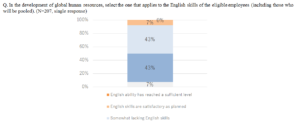
④Especially for English conversation skill, only 20% of companies measure it
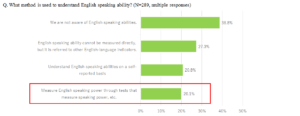
As mentioned earlier, “English speaking ability” is a very important skill in the practical global business scenes. On the other hand, only twenty percent of companies are quantitatively measuring this skill (e.g., using the speaking test). It is also part of the “visualization of skills” required for job-type employment, and the measurement of English conversation skill is expected to become increasingly important in the future
Comment from Tsubouchi, in charge of Global Leader Development Business
Based on the results of this survey, we have seen the current situation that many companies face issues in “visualization of skills,” which is important for Japanese companies, whose membership-type employment was common, to change to job-type employment. In order to expand our business globally, we cannot deny that distortions may arise from Japan’s unique customs, systems, and values. In order to operate a company that meets global standards, the first step is to promote visualization of skills.
We would be very grateful if anyone in charge of human resources who is conducting or considering global human resource development training or English training could give us a voice. We would like to propose the design of the training based on quantitative and objective facts.
Shunichi Tsubouchi Chief Strategy Officer
 At Boston Consulting Group, he supported the formulation and implementation of management strategies for leading companies in Japan and abroad, mainly engaged in organizational development, change management, and restructuring of human resources strategy.
At Boston Consulting Group, he supported the formulation and implementation of management strategies for leading companies in Japan and abroad, mainly engaged in organizational development, change management, and restructuring of human resources strategy.
At M3, as the senior director of the sales division, he supervised the sales team and the recruitment and training teams.
At RareJob, he is in charge of corporate planning and public relations. Currently also in charge of business development for the Global Leader Development business.
In RareJob, he supervise management planning and public relations. Currently in charge of business development for the global leader development business.
About the survey: RareJob Global Leader Developing Component Analysis Report 2020
Regarding the inspection of this full edition of the survey
Contact us form below if you wish to see all sections of this survey.
For press: press@rarejob.co.jp
Corporations:https://corporate.rarejob.com/resources
Press Contacts
PR Department, RareJob, Inc.
Email: press@rarejob.co.jp
